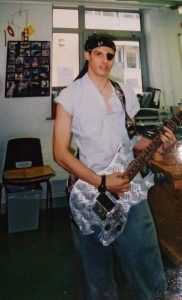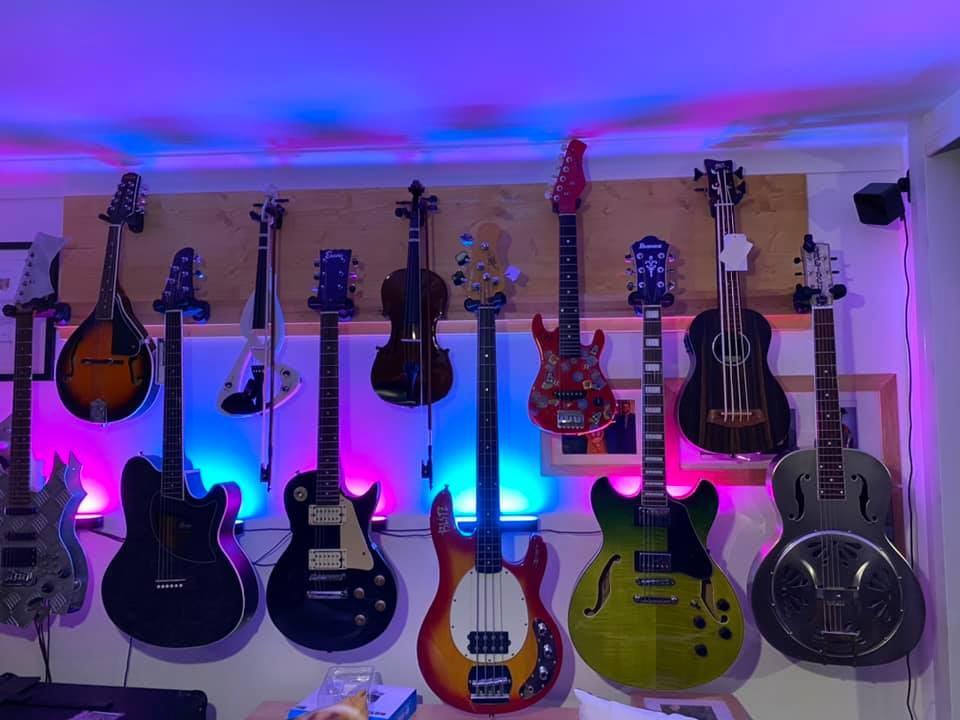Growing up I had a had a real love of performance. I used to a real buzz from the panic I felt before I stepped on stage, and knowing I had pushed myself through it. I loved to sing, and I played in a few bands during high school and 6th form. After some time, I decided that I really should learn an instrument.

“Bass looks easy” I remember thinking to myself “it’s only got four strings”. Yikes… how wrong I was. I spent a year learning to slap out simple baselines (to this day, the bass-line to Rappers Delight is burnt into my brain), but I couldn’t sing and play bass simultaneously… so I started picking up my sister’s electric guitar and began playing that. I still remember the first song I learnt, ‘Smells Like Teen Spirit’ by Nirvana, quickly followed by ‘Wonderwall’ by Oasis (the later was quickly banned by all local guitar shops).
My first guitar was actually one I built. For my 6th form DT project, I decided to make an electric guitar out of aluminium. It is still my favourite guitar to this day, even though its a pain to play (it’s surprisingly easy to stab yourself with it!).
So where am I going with this?
Now I’ve got the back-story out of the way, you may be wondering what the point of this post is – specifically, why have I chosen this title. My big annoyance is that I’ve never had a guitar lesson in my life. I taught myself by reading tabular music on the internet and watching videos of Kurt Cobain. I am relatively proud that I taught myself well enough to be able to perform, play with my band, and to strum out a few nursery rhymes to my son.
However, what was “acceptable” when I was a 17 year old punk feels less acceptable as a 30 *cough* something academic. I no longer want to thrash out Teen Spirit (well… not often anyway), and I would much rather noodle along to some blues in my jog-pants and slippers. But this is where I hit a problem.
I taught myself the bits of guitar that I wanted to learn, I skipped the boring stuff and went directly to Nirvana. As such, I can’t read music, I only know one scale, and there is a wealth of music theory that is lost on me.
You may be asking yourself… Why is this a problem? Just go back and learn that bit.
But here is the issue… I now have so much bad practice that I almost need to unlearn the skills I have taught myself. I basically need to completely retrain from the beginning. But this is painful! I have been working through a book, and some of the exercises feel many steps behind my ability level, and some just blow my mind. I don’t know which bits I need to work on, and which I can bypass. As such, I am pretty sure I am having to start right back from the beginning and do EVERYTHING. Honestly, it’s so frustrating, and it’s just so easy to loose focus, give up on the exercise, and start strumming out some 90s pop classics (‘Baby One More Time’ anyone?).
This made me think of some students I teach. Some students come to computer science knowing a little programming already. Many of these get frustrated when we go back to the core “programming fundamentals”. Basically, we need to train those core skills so that students will have a solid foundation to build on. To relate this back to the guitar, we need to teach them the scales, licks, and phrases so that they can jam out some rocking code.
However, my experience with the guitar has really highlighted to me why sometimes people get frustrated with this fundamental development. You often don’t realise where the gaps in your knowledge are until you are confronted by them. It can feel aggravating to go back to basics, and have to relearn a skill you believed you had mastered…. only to find out that you still have so much to learn. It certainly does for me at the moment.
So, how do we make this fundamental skills development less frustrating? In my case it has been a case of having constant reminders around me of why I love my guitar. Examples of great music, and trying not to be so hard on myself when I can’t keep up – and yes, occasionally playing ‘Wonderwall’ with the amp set to 11. I am trying to not worry, and just be excited about learning – and just love playing the guitar.
As we take students back to fundamental skills it is important to keep everything context-rich. Explaining why these foundations are key, and providing a clear roadmap of how these skills work together. Having exemplars on hand (surrounding yourself with great music) can help you see the larger picture. but also giving the students the capacity to flex their existing skills, and use that expertise that they have brought with them (Wonderwall will always be a great song). It is also useful to provide flexibility in how the students learn and develop, giving them the freedom to take their time, focusing on some areas of difficulty – with the guidance of and support of an expert who can tell you when it’s safe to skip ahead. This is what we can provide our students with (flexibility and guidance)… and ultimately what I am missing from my guitar practice.
So, this is where I am now… at the crossroads of my self taught experience. I now really need a mentor to help take me through to the next stage of my development and guide me through the fundamentals. If anyone knows a good guitar teacher that does Zoom lessons let me know!

One response
Chris. You and I have more in common than I thought. I’m self taught in the guitar and also think it’s blessing and a curse. My daughter aged 9 is operating at a higher musical grade than I am – but I can somehow carry the tune and do what I want to. I’m learning some scales. Some are easy. Some make no sense – I’m trying to learn in a way that compliments my base-line but it’s not easy. I like your observations.